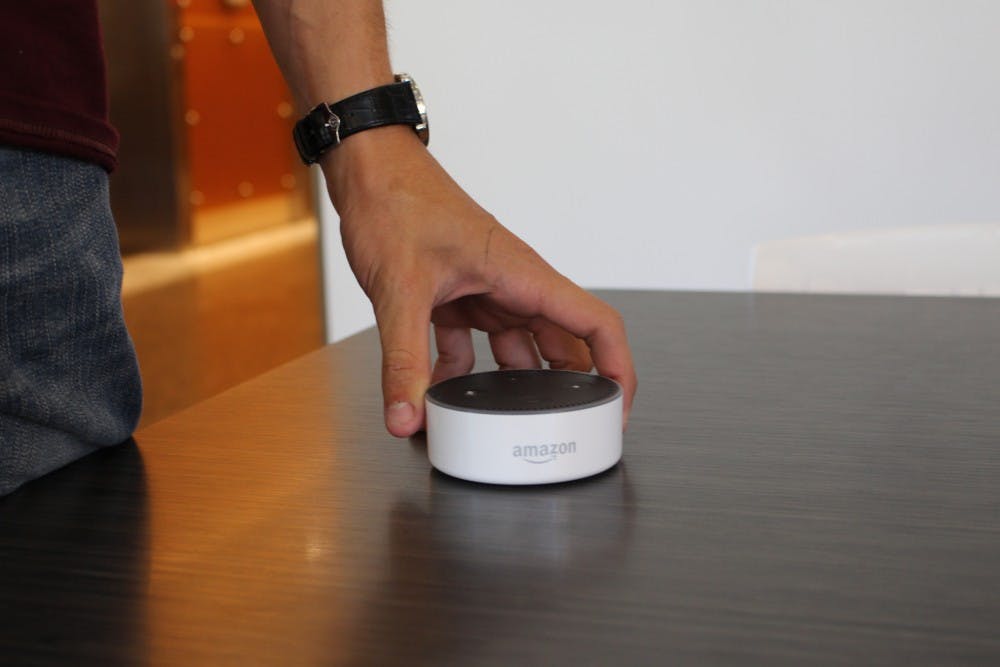As part of a partnership with the Amazon Alexa team, ASU engineering students now have the opportunity to learn immersive voice technology through the use of the Amazon Echo Dots.
The Amazon Echo program is the “first-of-its-kind immersive voice technology program on a university campus,” according to an ASU press release. With the voice technology skill, students will be able to take advantage of the University's first residence hall integrated with voice-enabled Echo Dots.
According to Amazon, Echo Dots are capable of answering questions, reading news, reporting traffic and weather and more with far-field voice recognition.
Students living in Tooker House, the new engineering residential hall, can volunteer to have the new Dots in their dorms.
According to an email statement from ASU spokeswoman Theresa Grant, Amazon and ASU began discussing the program back in 2016. The idea stemmed from the renovation of ASU's football stadium into the tech-enabled Smart Stadium.
The program aims to help students master voice-activated technologies so they can integrate them into their future engineering projects, Grant wrote.
"Once our students get into the voice components of the curriculum and have access to the development software being made available to Amazon, we expect to see great leaps in innovation," she said in the email.
Austin Brooksby, a freshman studying mechanical engineering in the Ira A. Fulton Schools of Engineering, said students are encouraged to use the Dots for both their studies and day-to-day lives.
“The Amazon Echo is basically an easy way of entering stuff into Google, so if you need to you can ask it a question, and it gives you very fast responses,” Brooksby said. “It just shortens the amount of time that you need to take to research, and it can give you definite and concurrent information. It’s not searching on Wikipedia. It gives you reliable information.”
Octavio Heredia, director for global outreach and extended education with the Fulton schools, said his program and the engineering faculty strive to incorporate the latest technology into their curriculum.
“It’s not like we’re necessarily changing our courses to support the Alexa, but it’s more about giving the best practices and the content that we are teaching within those courses,” Heredia said.
The Dots will be used in pilot engineering courses such as Principles of Mobile Application Development, Distributed Software Development and Software Integration and Engineering. An additional pilot course will run during the spring semester.
“(The program) has been very well received, (the professors) themselves are excited about providing another opportunity to their students, to be able to be a part of this project, and again trying to look at how do they integrate the leading-edge technology into their courses and into their students,” Heredia said.
Students not in the engineering program who already own a Dot can become involved in this initiative by downloading the Arizona State University – Events, Hours & Info (A.S.U.) application, or skill, to their device.
The application is available to any students, alumni, parents or anyone who has an Amazon Echo device. The application allows the user to get ASU-related facts and information through voice commands.
Heredia said expanding this program to other ASU degree programs will take some time and monitoring of the current pilot utilizations.
“We are trying to look at where are other opportunities within the campus, within other programs, within other courses, within other majors where this technology can be a fit,” Heredia said.
While the Dots can be used as academic tools, they also have the ability to act as a tool for everyday activities and include features such as the Alexa “Drop In" — which allows participants to project their voices on other Echo devices — voice purchasing and Bluetooth pairing cabilities.
When students were given their Dots, they also received an Amazon Echo Dot FAQ sheet, which outlines how to handle issues with privacy and information collection.
Cassie Rau, a sophomore double majoring in biological sciences and Spanish, said even though a Dot would probably ease the research process, she finds it unnecessary and doesn’t think she would use it in her personal life.
“I know in a lot of my classes teachers have a lot of technical difficulties, so as long as they know how to use (the Amazon Echo Dots) I feel like it could be helpful to have in the classroom,” Rau said.
Reach the reporter at afsuthe1@asu.edu or follow @a_sutherland10 on Twitter.
Like The State Press on Facebook and follow @statepress on Twitter.
Continue supporting student journalism and
donate to The State Press today.




